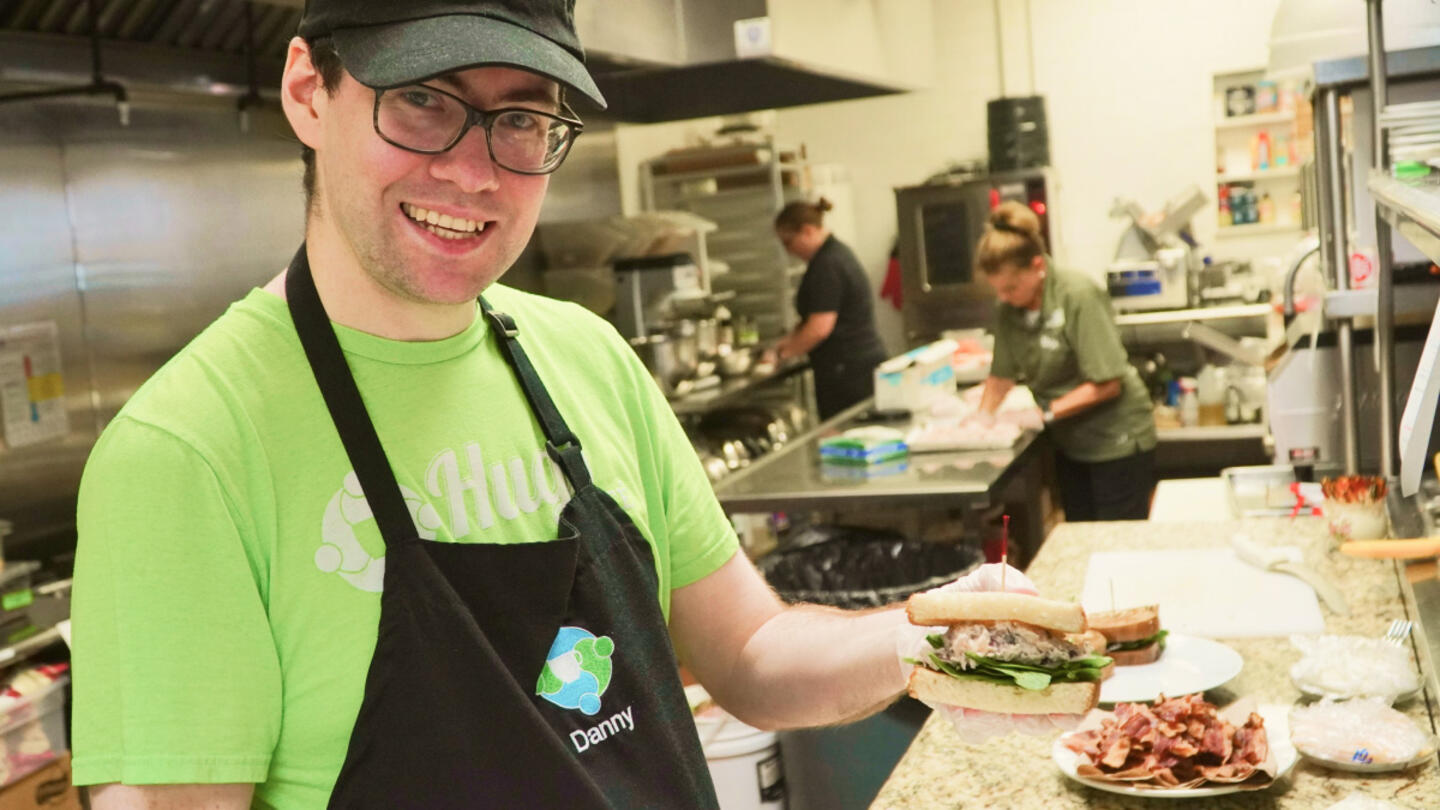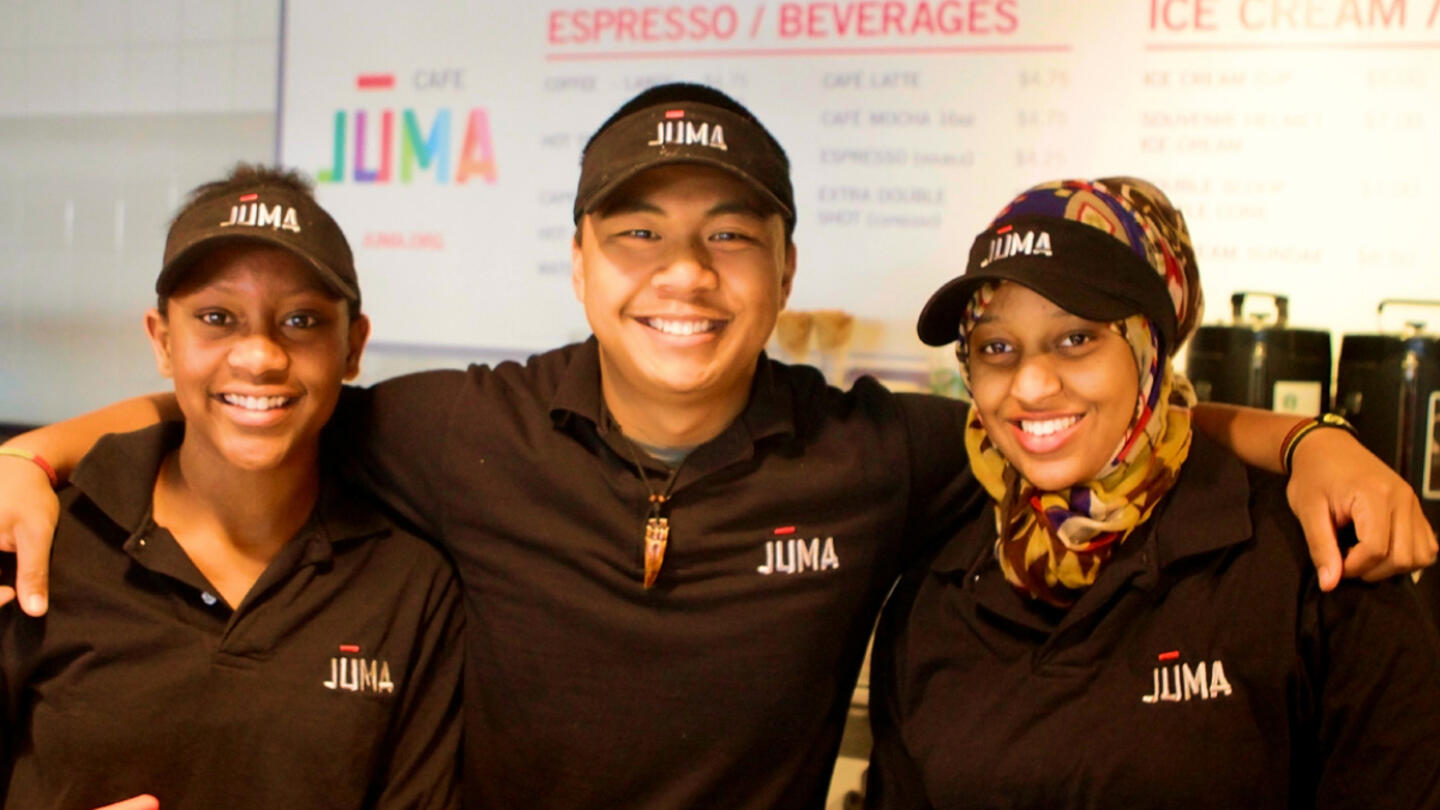Can you imagine trying to begin a career in 2020? Can’t do it? You must not be in Gen Z.
Imagine having to cancel internships you'd researched and planned or launching your career from your living room over Zoom. For more than 20 million Gen Zers, aka Zoomers, this was their reality.
As a demographic, Gen Z is bouncing back, but not all. Over 5 million Zoomers aren’t working or going to school. This is a huge issue with many potential impacts on our society. Research shows that if these “opportunity youth” aren’t connected to a career pathway by the time they are 25, they are at high risk for a lifetime of unemployment, poverty, and homelessness.
The barriers to employment are high for all young people, but for those at risk, it can be even more of a challenge. Some haven’t graduated high school; others spent time in foster care or have been impacted by the criminal justice system. Add COVID and other employment barriers like unstable housing, transportation, child care, and mental health issues, and it’s even more challenging.
Enter Juma Ventures, a social enterprise devoted to helping youth overcome employment barriers. In partnership with sports arenas in multiple cities, the organization offers a lifeline to stability now and in the future. “We’re able to help youth in their stability as they find their path to mobility,” said Juma Ventures CEO Adriane Armstrong. “If you don’t know where you’re going to sleep tonight, how could you think about next week, let alone next year?”
Juma’s secret sauce is an incredibly hectic first job mixed with an intentional management style that prioritizes employee well-being — in real time. This focus on growth and the dignity of work begs the question: Where could a future full of young people with direction take us as a nation?
Why young people are falling through the cracks
No one plans to be homeless or live in poverty. Donna Franklin didn’t. She wanted to be a probation officer and help young people dealing with the criminal justice system. But that’s not what happened.
“I ended up a teenage mom and had my baby at 17,” she said. At her lowest point, she and her young son were living in a car. “I didn't really have much support at all.”
There are many risk factors that lead to youth becoming disconnected from their families and communities: generational poverty, parental incarceration, traumatic experiences, dropping out of school, teen parenthood, and the list continues. Each person and each situation is different, but at the core of all those risks is a lack of support.
“These young adults go through so much, and a lot of them don't have support systems,” said Claire Wheeler, director of impact at Juma. They don’t have anyone to help navigate the choppy waters of life.
This disconnect has serious consequences for individual young people as well as our nation. “Opportunity youth” are twice as likely to live in poverty, nine times more likely to never graduate from high school, and four times more likely to become young parents than their peers. Only 1% of them will earn an associate’s degree or higher, compared to 36% of the general population. One estimate puts the economic cost of these young people falling through the cracks at $93 million a year.
But reconnecting young people to the workforce and community is complicated. In fact, research shows that some of the largest programs in the country only have short-term impact. The most successful programs help youth achieve stability — housing, childcare, counseling, etc. — in their present circumstances while offering them meaningful work, vocational training, and a community of support.
Who knew? Working concessions at baseball games is like life
As it turns out, high-stress work environments — like the ones many young people experience — can be great training for life. Selling corn dogs, nachos, and drinks at major sporting and entertainment events is intense. Workers serve thousands of people at each event. It’s all great training for life.
When Juma youth are on the job, they’re surrounded by support. They are part of a team that is doing hard things together. When they ask for help, they can expect to receive it. This is where they learn teamwork, professionalism, accountability, and problem-solving. Most importantly, they learn from their managers, who model how healthy relationships work.
“We're able to provide this supportive relationship between manager and employee,” said Wheeler. “We’re modeling what it could be like and what it should be like.” These relationships are intentional. The first lesson Juma youth learn is to trust another person. It’s the foundation of all the growth to follow.
One of Wheeler’s employees once came to her halfway through a shift wanting to quit. “Let's take 10 minutes,” Wheeler told her. “Take a break. Come back. Talk to me.” After they talked, the young woman agreed to stay, and Wheeler sent her to a different concession stand. When the shift was over, she came back beaming. “She was like, ‘I am so happy right now. I was so successful, and the manager said I did so good.’”
That’s the transformation Wheeler is always hoping for. “It’s that switch of ‘I want to leave. I want to quit. I don’t want anything to do with this,’ but then becoming so confident in herself,” she said. “That’s a big priority for us.”
In addition to time on the job, Juma youth are paid for time spent learning about job searching, career development, and financial literacy. Each young person is supported by a program coordinator who helps them stabilize their living circumstances and overcome personal barriers to long-term employment.
Last year, 519 Juma youth served concessions in four cities. While they were working 60,000 hours, they were also learning to work on a team, manage their own emotions, and trust the people supporting them — and they earned $1.2 million in wages.
Sign up for the Strong & Safe Communities newsletter for stories, ideas, and advice from changemakers working with their neighbors to address the biggest problems we face.
We help them do it anyway
When Franklin joined Juma, Wheeler was her manager. She was eager to grow. Before she even started the Juma job, she emailed Wheeler and told her she wanted leadership opportunities. “So I said, ‘OK, let’s go,’” Wheeler recalled. “We're super invested in our youth and want them to succeed in what that looks like for them.”
Wheeler allowed Franklin to work in several different positions to learn the ins and outs of concessions. Within a few months, Franklin was Wheeler’s assistant manager. Today, she’s the Sacramento site manager.
But not every young person comes to Juma with that level of ambition. “I can think of a nice handful of super introverted [employees],” said Franklin. One of them is Max.
A year and a half ago, Max was struggling. “They were very, very quiet, very shy, very timid, almost scared to take that next step or that initial introduction,” Franklin explained. “It was very hard for them to be on [the cash] register. It was hard for them to communicate with other team members.”
“She really challenges them,” said Wheeler about Franklin. “She pushes that growth mindset of ‘We're gonna challenge you because you can do more than this, and we believe in you.’”
Today, Max is a totally different person. According to Franklin, they’re now the loudest person on the crew. “They have amazing customer service. They’re the first person to raise their hand for any volunteer opportunities. Max can make conversation with anybody and everybody. That confidence barrier has really dissipated.”
When incidents happen at work, find out why
Sometimes, personal struggles spill over at work. This is especially true for youth facing big challenges, like housing insecurity or generational poverty.
“If you don't have a home, you're focused on trying to find one,” said Wheeler. “You're not thinking about going to work five days a week.” It’s a balance between teaching employees to respect expectations and recognizing that these young people have a lot of hard things they’re dealing with.
“We approach different situations with a lens of, maybe this person isn't just acting out because they're rude,” she said. “Is there something else that could be going on?” She once had an employee fall asleep on the job. It would have been easy to reprimand him or send him packing, but instead, Wheeler asked him what was going on.“It turned out that he was experiencing troubles at home, and he wasn’t sleeping at night,” she said. So, she scheduled him for later shifts.
These conversations are about managers and employees working together to find the best way forward, and they happen in real-time, said Franklin. While passing out iced coffees and soft pretzels, she and the other managers are intentional about “making space and time to really notice and see our young people and meet them where they're at.”
It’s part of the trauma-informed care practices that define Juma’s management style. All the managers are, like Franklin, former Juma youth. They’ve been where their employees are, and they know what it’s like to come to work when you’re struggling.
Managing a successful shift is not Franklin’s most important priority. “If we're just focusing on work and work only, why are we here?” she said. “That's not why we're here.”
The job opens up “opportunities for [Juma youth] to build from being on the job,” said Wheeler. “They’re learning and being coached and mentored by someone who really does care about them and wants to support them. We want to be the ones that believe in them and invest in the goals and dreams they want to go after.”
***
Juma Ventures is supported by Stand Together Foundation, which partners with the nation’s most transformative nonprofits to break the cycle of poverty.
Learn more about Stand Together’s efforts to build strong and safe communities, and explore ways you can partner with us.

People with disabilities want meaningful work — and Hugs Cafe is making it happen.

At this ‘resort,’ children with intellectual disabilities are seen as gifts to be celebrated and loved.

Veterans experience loss when leaving service. Could this be key to understanding their mental health?

The Grammy-nominated artist is highlighting the stories we don’t get to hear every day.
